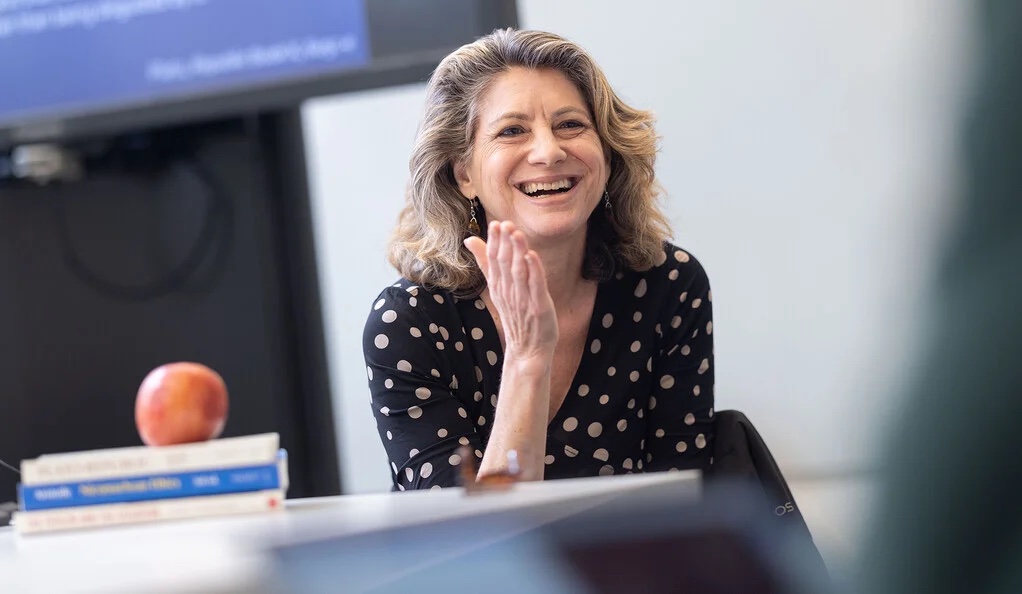FAS Dean Tamar Gendler to step down in December
The University president and provost will assemble a faculty advisory committee to select a successor for Gendler, who will return to the Yale faculty after completing her term as inaugural dean of the Faculty of Arts and Sciences on Dec. 31.

Yale News
On Dec. 31, Tamar Gendler will step down after completing her second term as the inaugural dean of the Faculty of Arts and Sciences.
The end of Gendler’s term was announced by University President Maurie McInnis in an email to the Yale community on Tuesday. Gendler, who first assumed her role as FAS Dean on July 1, 2014, will go on sabbatical at the beginning of 2025 before returning to continue researching and teaching at Yale. The announcement did not specify Gendler’s return date.
“The FAS has reached a moment of maturity; it is strong and secure,” Gendler wrote in an email to FAS department and program chairs. “And so, as the second quarter of the twenty-first century dawns, I will have the privilege of passing the mantle of leadership to one of my colleagues.”
The FAS dean oversees the hiring, mentoring and compensation of over 1,000 faculty members across 40 departments and programs. The dean also manages the FAS budget, whose spending totaled over $800 million in the 2024 fiscal year.
Under Gendler’s decade-long tenure, the Faculty of Arts and Sciences has seen significant transformation in its governing structure, with the establishment of divisional deans and the FAS-SEAS Senate coming within a year of Gendler assuming her position.
“It was the project, then, of my first five years as dean to build the infrastructure that is now how FAS runs,” Gendler told the News. “The first five years were devoted to figuring out what systems will work, and the next five years were devoted to operating with them in a way that they became part of the fabric of the school and of the faculty.”
Per McInnis’ email, Gendler “conceived of and implemented the current structure of the Faculty of Arts and Sciences, including her own role as dean.” Prior to her deanship, Gendler staffed the Ad Hoc Committee on Decanal Structures, a committee of six other faculty members who were charged by then-University President Peter Salovey to evaluate options for the administrative structure of Yale’s Faculty of Arts and Sciences.
In January 2014, the Committee published a report recommending a three-dean model in which a new dean governing faculty issues would work jointly with the dean of Yale College and the dean of the Graduate School.
“Before there was an FAS dean, there was no institutional structure which enabled us to coordinate academic priorities with the resources to support those priorities,” Gendler told the News. “The Yale College dean and the dean of the Graduate School oversaw the academic activities of those schools, and the Provost’s Office oversaw the budget, but there was no space where those two essential aspects of administration were combined. What I feel most proud of is having developed a structure that left a powerful role for the dean of the College, that left a powerful role for the provost, but that allowed us to govern the FAS in a way where resources and academic ambitions are aligned.”
According to Gendler, the process to select her successor will likely involve an advisory committee of FAS faculty, who will recommend five or six finalists to the University president and provost to make a selection.
Gendler also said that the committee will likely set up multiple avenues for members of the Yale community to provide recommendations and feedback in the selection process, such as through a website and listening sessions. In particular, Gendler said, the committee will hold listening sessions with Yale staff members “because a lot of the work that the FAS dean does is with staff.”
When it comes to the selection process, Gendler said she hopes that her successor will meet four criteria: “joy in creating community, academic excellence, readiness to manage a staff and experience managing a budget.”
In particular, Gendler explained that because the FAS dean leads Tenure and Appointments Committees, her successor must be a “scholar of such stature such that the faculty will respect their leadership.”
Gendler also warned of the challenges that her successor will face, especially when it comes to balancing the interests of faculty and students with broader discourses.
“My successor will face all of the challenges that universities face with regard to public conversation that range from issues around affirmative action, issues around nonprofit status, issues around free speech, issues around institutional neutrality,” Gendler said. “In addition, there’s a whole set of geopolitical issues that my successor will face.”
In the meantime, Gendler will go on sabbatical in California, where she will study “a West Coast way of thinking about cognition and about education.”
Upon her return, Gendler hopes to combine her new knowledge with Yale’s new and ongoing initiatives on education and artificial intelligence.
“I’m going to come back and do what Yale faculty have the privilege of doing, which is to be a researcher, a teacher and an administrator, all at the most fascinating and supportive institution in the world,” Gendler said.
Gendler graduated from Yale College in 1987.







